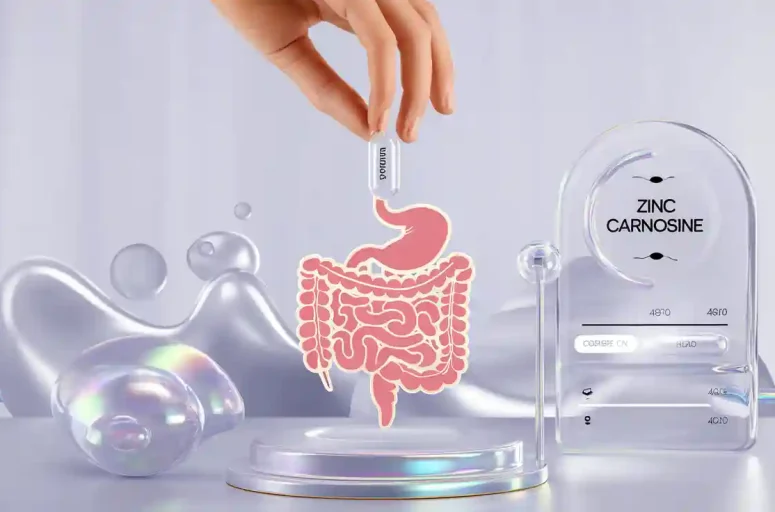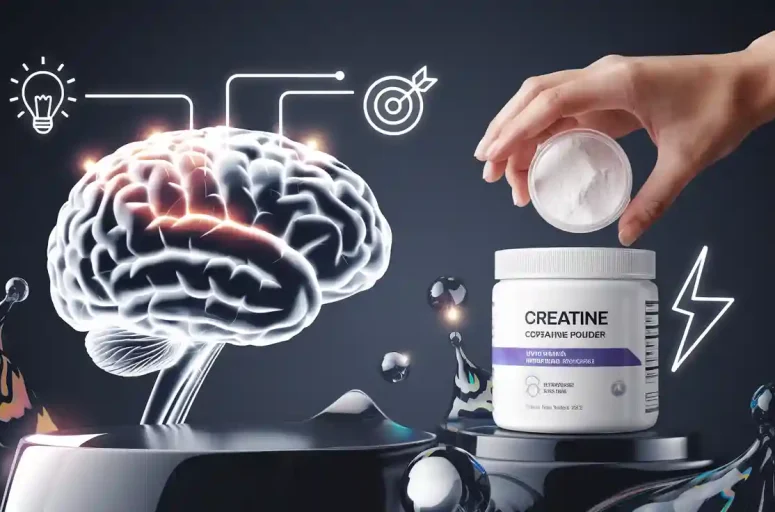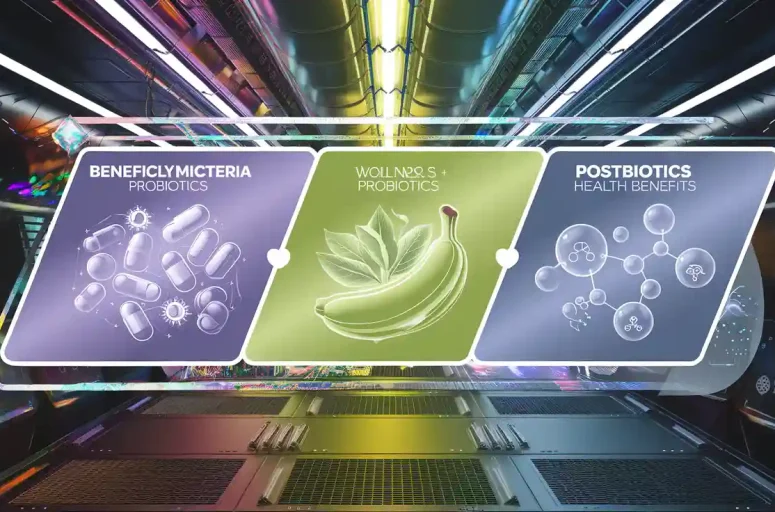
You may know collagen helps your skin look young, but many people wonder about other anti-aging supplements. The anti-aging supplement market is getting bigger. More people now choose anti-aging supplements with antioxidants and other nutrients. These anti-aging supplements can help your skin stay healthy and support your whole body. Research shows these anti-aging supplements may make muscles stronger. They can also slow down aging and help your immune system.
Key Takeaways
Collagen keeps skin firm and smooth. It works best with other anti-aging supplements. Supplements like hyaluronic acid, CoQ10, resveratrol, curcumin, omega-3s, and vitamin C help skin stay moist and stretchy. They also protect cells from harm. Healthy habits help these supplements work better. Eat a balanced diet and drink enough water. Get good sleep, use sunscreen every day, and exercise often. Pick supplements that fit your needs. Talk to a doctor to make sure they are safe and work well. Choose high-quality supplements that are tested by others. Follow the directions for how much to take. Using different supplements can help with many aging signs. Always ask a doctor before mixing them. Anti-aging supplements can also help your joints, muscles, and body heal. Starting these supplements early, even in your 20s or 30s, can help protect your skin and body as you get older.
Why Look Beyond Collagen?
Benefits of Collagen for Anti-Aging
People talk about collagen a lot when they mention anti-aging. Collagen is a protein that keeps your skin firm and smooth. Taking collagen supplements can make your skin feel softer and look fuller. Many studies show collagen helps your skin in different ways:
Oral hydrolyzed fish cartilage made skin better in a study with two groups.
Collagen peptides with other nutrients helped women have fewer wrinkles and more elastic skin.
Tuna collagen peptides helped skin health in a special trial.
Hydrolyzed chicken cartilage extract made adult women’s faces and tissues better.
Scientists tested many types of collagen in different studies. Here are some results:
Study / Source | Collagen Source | Outcomes on Skin Hydration and Elasticity |
|---|---|---|
D.U. Kim et al. (2018) | Low-molecular-weight peptide | Improved hydration, elasticity, and fewer wrinkles |
S. Koizumi et al. (2018) | Fish scales-derived peptides | Better hydration and elasticity |
L. Bolke et al. (2018) | Type unspecified | Improved hydration, elasticity, and skin density |
S.R. Schwartz et al. (2019) | Chicken cartilage extract | Improved facial skin and connective tissue |
Meta-analysis of 23 RCTs (2025) | Various sources | Overall improvement, but mixed results |
These studies show collagen can help your skin look younger and have fewer wrinkles.
Limitations of Collagen
Collagen helps your skin, but it does not fix all aging signs. Some studies do not always agree. The benefits of collagen can change by source, amount, and how long you use it. Sometimes, studies use different types or mix collagen with other things, so it is hard to compare. People in these studies have different ages, diets, and ways of living. These things can change how well collagen works.
Note: Some studies say we need more research to know how much collagen helps. Eating healthy and drinking water are also important for your skin as you get older.
Importance of Complementary Anti-Aging Supplements
You want your skin and body to be their best. That is why you should try more than just collagen. Scientists say other anti-aging supplements help your skin and slow aging. Supplements like CoQ10, NMN, resveratrol, curcumin, omega-3s, and hyaluronic acid work in different ways. They help your cells make energy, fix DNA, and fight swelling and stress. These things can make your skin more stretchy, give you fewer wrinkles, and help you look and feel younger.
Supplement | Scientific Benefits | Natural Food Sources |
|---|---|---|
Collagen Peptides | Improve skin elasticity and hydration, reduce wrinkles | Bone broth, fish skin, chicken skin |
Coenzyme Q10 (CoQ10) | Boosts energy, reduces stress, improves skin texture | Organ meats, salmon, spinach |
Resveratrol | Antioxidant, reduces inflammation, protects DNA | Red wine, grapes, peanuts |
Omega-3 Fatty Acids | Enhances hydration, reduces inflammation | Salmon, flaxseed, walnuts |
NMN | Increases energy, supports repair, slows aging | Broccoli, tomatoes, avocado |
Astaxanthin | Antioxidant, protects against UV damage | Algae, salmon, shrimp |
Curcumin | Anti-inflammatory, antioxidant | Leafy greens, cruciferous veggies |
Hyaluronic Acid | Attracts moisture, plumps skin, reduces fine lines | Bone broth, tofu, oranges |
You can get some of these nutrients from food, but supplements give you more. Using different anti-aging supplements and living healthy can help you see better results over time.
Best Anti-Aging Supplements Beyond Collagen

When you want the best anti-aging supplements, you need to look past just collagen. Let’s explore some other powerful options that can help you keep your skin healthy and youthful.
Hyaluronic Acid
Skin hydration benefits
Hyaluronic acid is a superstar for skin hydration. Your skin needs water to stay plump and smooth. Hyaluronic acid acts like a sponge, holding onto water and making your skin feel soft. Many people use it in creams, but you can also take it as a supplement.
A clinical trial with 129 women showed that taking 100 mg or 200 mg of hyaluronic acid every day made a real difference. After just four weeks, their skin hydration improved a lot compared to those who took a placebo. The results stayed strong for up to 12 weeks. This means you can see and feel the change in your skin when you add hyaluronic acid to your routine.
Oral HA Dose (mg/day) | Baseline (0 week) | 2 weeks | 4 weeks | 8 weeks | 12 weeks |
|---|---|---|---|---|---|
0 (Placebo) | 38.5 | 39.3 | 39.5 | 39.0 | 39.1 |
100 | 36.7 | 37.5 | 38.0 | 37.3 | 36.1 |
200 | 37.4 | 37.8 | 38.2 | 38.7 | 37.3 |
Bold numbers show the biggest improvements in skin hydration.
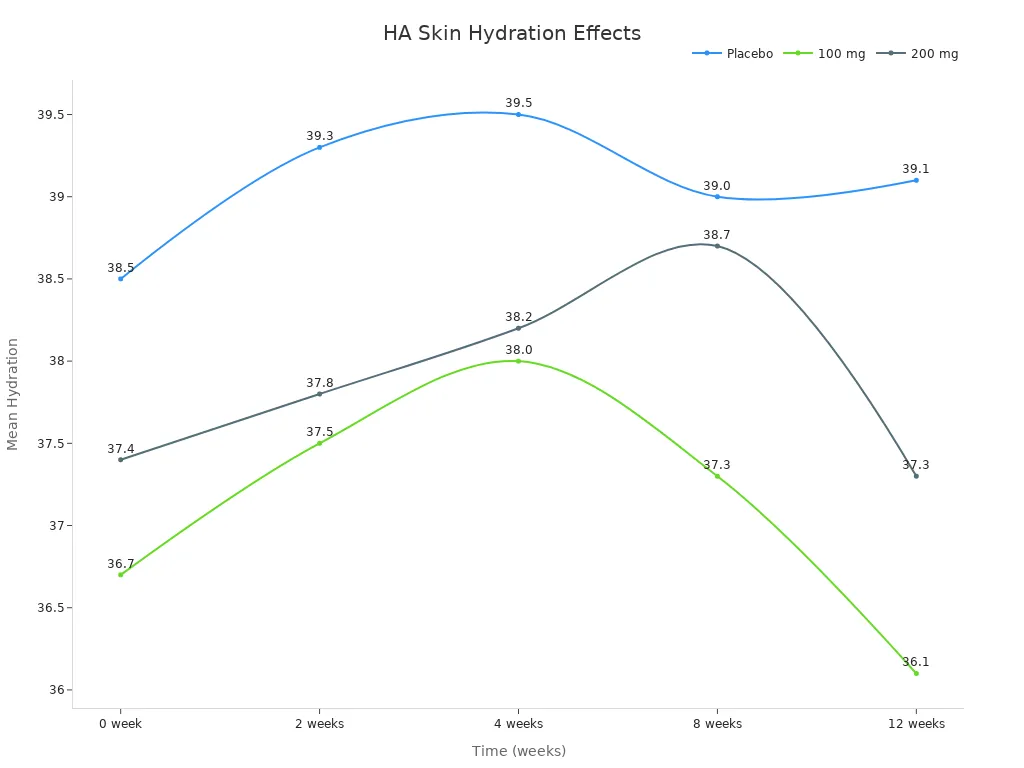
Tip: If you want to boost your skin hydration, try a daily hyaluronic acid supplement. You can find a top-rated option here.
Enhancing elasticity
Hyaluronic acid does more than just hydrate. It also helps your skin bounce back and feel firmer. Some studies found that people who took hyaluronic acid noticed their skin elasticity improved. This means your skin can stretch and move without forming deep lines. While results can vary, many users say their skin feels more youthful and less dry.
Coenzyme Q10
Cellular energy support
Coenzyme Q10, or CoQ10, is another favorite among the best anti-aging supplements. Your body uses CoQ10 to make energy in your cells. As you get older, your natural levels drop, which can make your skin look tired.
CoQ10 is found in your skin, especially in the top layer.
Levels go down as you age or spend time in the sun.
When you take CoQ10, your cells get a boost and work better.
Promoting skin health
CoQ10 does more than help with energy. It can also make your skin look smoother and younger. In one study, women who took 50 mg or 150 mg of CoQ10 every day for 12 weeks saw fewer wrinkles and better skin smoothness. Higher doses worked even better. CoQ10 also helps your skin fight off damage from the sun and pollution. Some creams with CoQ10 can make your skin feel softer and more hydrated.
Note: CoQ10 may also help your skin stay firm by supporting collagen production and reducing inflammation.
Resveratrol
Anti-aging properties
Resveratrol is a natural compound found in grapes and red wine. Many people call it a “longevity molecule.” It works by turning on special pathways in your body that help slow down aging. Clinical trials show that resveratrol can help your brain, heart, and skin stay healthy as you age.
Resveratrol helps your body fight inflammation.
It can improve how your cells clean up damage and make new energy.
Some people use it to help with memory and focus as they get older.
Chromosome protection
Resveratrol also protects your chromosomes. It helps keep your DNA safe from damage, which is important for staying young. Scientists found that resveratrol can help your cells repair themselves and keep your chromosomes stable. This means your skin and body can stay healthier for longer.
If you want to try one of the best anti-aging supplements, resveratrol is a smart choice. It works in many ways to help you look and feel your best.
Curcumin
Anti-inflammatory effects
Curcumin comes from turmeric, a bright yellow spice you might know from curry. You may not realize it, but curcumin is one of the best anti-aging supplements for fighting inflammation. As you age, your body can build up low levels of inflammation, sometimes called “inflammaging.” This can make your skin look older and feel less healthy. Curcumin helps by blocking certain signals in your body that cause inflammation, like NF-κB. When you take curcumin, it lowers the levels of things in your blood that show inflammation, such as CRP and cytokines like IL-8 and TNF-α. These changes can help your skin stay calm and less red.
Curcumin reduces the amount of inflammatory chemicals your body makes.
It helps your skin look smoother and feel less irritated.
Some people notice their skin feels better and looks brighter after using curcumin.
If you want to support your skin health and slow down signs of aging, curcumin is a smart choice for your anti-aging routine.
Antioxidant benefits
Curcumin does more than fight inflammation. It also acts as a powerful antioxidant. Your skin faces damage every day from things like sunlight and pollution. This damage can hurt your DNA, proteins, and fats in your skin. Curcumin helps by cleaning up harmful molecules called free radicals. It also boosts your body’s own antioxidant enzymes, like SOD and catalase. These enzymes protect your skin from damage and help you look younger.
Curcumin helps your cells repair themselves.
It keeps your skin looking fresh and healthy.
You get extra anti-aging benefits when you add curcumin to your daily routine.
Omega-3 Fatty Acids
Supporting the skin barrier
Omega-3 fatty acids are another top pick for anti-aging vitamins. You find them in fish oil, salmon, and walnuts. These healthy fats help your skin barrier stay strong. When your skin barrier works well, your skin holds onto moisture and keeps out germs. Studies show that omega-3 fatty acids can help people with dry or itchy skin. They make your skin feel softer and less irritated.
Omega-3s boost the proteins that keep your skin barrier healthy.
People who take omega-3 supplements often notice less dryness and redness.
Reducing inflammation
Omega-3 fatty acids also lower inflammation in your skin. If you have redness, itchiness, or even acne, omega-3s can help calm things down. Some studies found that people who took fish oil had less sunburn and fewer skin problems. Omega-3s work by changing how your immune system reacts, so your skin feels better and looks clearer.
Tip: Adding omega-3s to your diet or supplement routine can help you get the anti-aging benefits you want for your skin.
Vitamin C
Boosting collagen production
Vitamin C is one of the most important anti-aging vitamins for your skin. Your body needs vitamin C to make collagen. Collagen gives your skin its shape and keeps it firm. Without enough vitamin C, your skin can lose its bounce and start to sag. Studies show that vitamin C helps your skin cells make more collagen and keeps the collagen strong. It also helps your skin heal faster after small cuts or scrapes.
Benefit of Vitamin C | How It Helps Your Skin |
|---|---|
Collagen production | Keeps skin firm |
Faster healing | Repairs damage |
More bounce | Reduces sagging |
Preventing oxidative damage
Vitamin C also acts as an antioxidant. It protects your skin from damage caused by sunlight, pollution, and stress. When you use vitamin C, your skin can fight off harmful molecules called reactive oxygen species. This keeps your skin looking bright and healthy. Some research shows that even small amounts of vitamin C can help your skin stay strong and resist damage.
You can find vitamin C in oranges, strawberries, and many anti-aging supplements. It’s a simple way to boost your skin health and support collagen production.
EGCG (Epigallocatechin Gallate)
Found in green tea
You might know green tea as a healthy drink, but did you know it contains a special compound called EGCG? This powerful antioxidant gives green tea many of its health benefits. When you drink green tea, you get EGCG along with other helpful plant chemicals. EGCG helps your body fight off damage from free radicals, which can speed up aging.
Preventing age-related diseases
EGCG does more than just protect your cells. It also helps your brain and heart stay healthy as you get older. Scientists have found that EGCG can slow down or even prevent some age-related diseases. Here’s what research shows:
EGCG helps clear out harmful proteins in the brain, like those linked to Alzheimer’s disease.
Mice given EGCG had fewer brain plaques and better memory.
EGCG and other green tea compounds stopped brain proteins from clumping and improved thinking skills in animal studies.
Taking EGCG reduced brain inflammation and protected memory in mice.
People who drink green tea often have a lower risk of dementia and better brain health.
EGCG also supports your heart. Studies show that people who drink green tea have a lower risk of heart disease and stroke. EGCG helps your body handle stress, improves how your cells use energy, and may even help you live longer. In some studies, animals given EGCG lived longer and had better health as they aged.
Tip: Try adding a cup or two of green tea to your daily routine. You’ll get EGCG and other helpful nutrients that support healthy aging.
Astaxanthin
Potent antioxidant properties
Astaxanthin is a bright red pigment found in algae, salmon, and shrimp. It’s one of the strongest antioxidants you can find. Your body uses antioxidants to fight off damage from sunlight, pollution, and stress. Astaxanthin works by stopping harmful molecules called free radicals before they can hurt your skin or other cells.
Study Type | Dose & Duration | Main Results |
|---|---|---|
RCT | 4 mg for 9 weeks | Skin became more resistant to sunburn |
RCT | 2 or 8 mg for 8 weeks | Less DNA damage and inflammation |
Clinical Study | 4 mg for 4 weeks | Fewer signs of skin aging |
Oral + Topical | 6 mg oral + topical for 8 weeks | Fewer wrinkles, less dark spots, better elasticity |
RCT | 6 mg for 6 weeks | Smoother skin, fewer wrinkles, better moisture |
These studies show that astaxanthin can protect your skin and keep it looking young.
Skin protection from damage
Astaxanthin does more than just fight free radicals. It also helps your skin heal and stay strong. When you take astaxanthin, your skin becomes better at handling sun exposure and less likely to get damaged. It boosts your skin’s natural defenses and helps repair DNA. People who use astaxanthin often notice smoother skin, fewer wrinkles, and less redness.
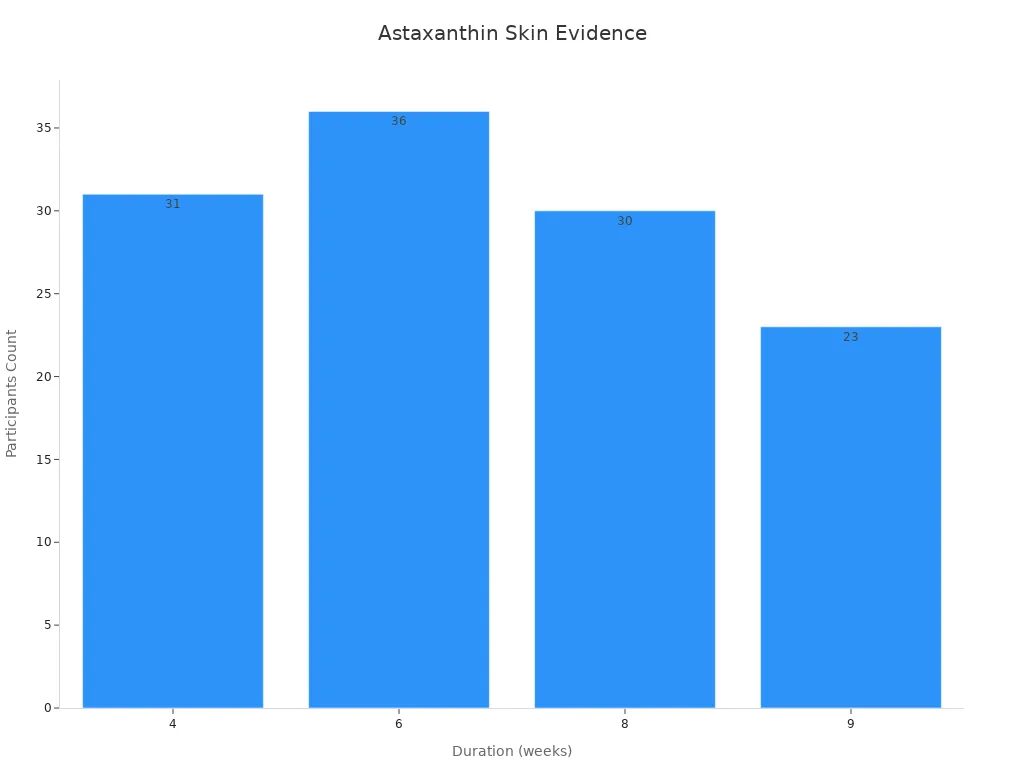
Note: Astaxanthin is safe to use and works well in both supplements and creams. It’s a great choice if you want to protect your skin from aging and sun damage.
Nicotinamide Mononucleotide (NMN)
Boosting NAD+ levels
NMN is a special molecule your body uses to make NAD+. NAD+ is important for energy, cell repair, and keeping your body young. As you get older, your NAD+ levels drop. This can make you feel tired and slow down your body’s repair systems. Taking NMN helps your body make more NAD+, so your cells work better.
Scientists have tested NMN in both animals and people. In animal studies, NMN raised NAD+ in many organs, improved how cells made energy, and helped fix DNA. In a study with older men, taking 250 mg of NMN every day for several weeks boosted NAD+ in the blood and made muscles work better. People in the study felt stronger and had better grip strength.
Promoting longevity
NMN does more than just boost energy. It also helps your body fight aging. By raising NAD+, NMN turns on special proteins that repair DNA and protect your cells. These proteins help your body handle stress, fix damage, and stay healthy as you age. In animal studies, NMN slowed down aging, reduced inflammation, and helped animals live longer. Early studies in people show NMN is safe and may help you stay active and healthy as you get older.
If you want to support your energy, muscle strength, and healthy aging, NMN is a promising supplement to consider.
Glutathione
Combating oxidative stress
Glutathione is called the “master antioxidant.” Your body makes it, but you have less as you get older. Glutathione helps your cells fight damage from sunlight and pollution. It also helps with stress. Taking glutathione as a supplement helps clean up free radicals. Free radicals can make you age faster and dull your skin.
Researchers found that 250 mg of glutathione each day can lower melanin in your skin. This can make your skin look brighter and more even. Glutathione blocks an enzyme called tyrosinase. Tyrosinase helps make dark pigment in your skin. By blocking this enzyme, glutathione helps your skin look lighter and protects you from UV damage. Studies show both oral and topical glutathione can reduce wrinkles and keep your skin fresh.
Improving skin appearance
Glutathione does more than fight stress in your cells. It helps your skin stay hydrated and elastic. People who use glutathione often say their skin feels smoother and looks younger. In one study, people who took glutathione had fewer wrinkles and more elastic skin after a few weeks. The supplement also helped reduce dark spots and made skin look brighter. Most people do not have side effects when using oral or topical glutathione. Doctors do not recommend intravenous use because it may not be safe.
Tip: If you want to help your skin stay healthy and look its best, glutathione is a smart choice for your routine.
Biotin
Supporting healthy hair, skin, and nails
You see biotin in many beauty supplements. People call it the “hair, skin, and nails” vitamin. Biotin helps your body make keratin. Keratin builds strong hair and nails. Some people with weak nails or health problems see big changes with biotin. For example, people with biotin deficiency or rare hair problems can get thicker nails and better hair growth after using biotin.
But if you already get enough biotin from food, taking more may not help. Studies show healthy people do not always see changes in their hair, skin, or nails with extra biotin. The real benefits are for people who do not get enough biotin or have special needs. Still, biotin is important for strong hair and nails if you do not get enough from food.
Fisetin and Quercetin
Reducing inflammation
Fisetin and quercetin are plant compounds in fruits and vegetables. You may not hear about them as much as other supplements, but they help fight inflammation. Fisetin clears out old, damaged cells that cause swelling and make you feel tired. Quercetin blocks enzymes that cause inflammation and calms your immune system.
Fisetin lowers signs of aging cells and cuts down harmful molecules.
Quercetin reduces swelling by stopping certain chemicals and helps control allergies without making you sleepy.
Promoting cellular health
These two supplements do more than fight inflammation. They help your cells stay healthy as you get older. Fisetin acts as a “senolytic.” This means it helps remove old cells that do not work well. This keeps your tissues younger and healthier. Quercetin helps your cells fight stress and repair themselves.
Fisetin and quercetin work together to protect your cells from damage.
They help your body clear out “zombie” cells and keep your tissues working well.
Some studies show these supplements may help your brain and immune system stay strong.
Note: Fisetin and quercetin are safe for most people, but talk to your doctor before starting any new supplement, especially if you take other medicines.
How to Choose the Right Anti-Aging Supplements
Assessing Individual Needs
It is important to think about your own needs first. Everyone’s body is unique. What helps one person may not help another. Your age, health, and genes can change how you react to supplements. Some people need more vitamin D. Others might need more magnesium or omega-3s.
To pick the best supplements, look at your health and family history. Think about your daily habits too. Doctors and scientists use tests to help people choose. These tests include blood tests, genetic tests, and health trackers. You can also notice how you feel after starting a new supplement. If you feel more energy or sleep better, it might be working.
Check your family’s health problems.
Think about what you eat and how much you move.
Ask your doctor about blood tests or health trackers.
Watch for changes in your skin, sleep, or mood.
Tip: Getting advice just for you works best. Your needs can change, so keep checking on yourself.
Consulting Healthcare Providers
Always talk to a healthcare provider before trying new supplements. Doctors, dietitians, and pharmacists know how to match supplements to your health. They help you avoid problems, like mixing supplements with your medicine. They also make sure you do not take too much.
Healthcare providers use science and rules to make safe choices. They look at your test results, diet, and lifestyle. Sometimes, they use special tests to check for vitamin or mineral shortages. They also know the newest research on anti-aging supplements. This helps you stay safe and get the most out of your supplements.
Doctors can find side effects.
Dietitians help you balance food and supplements.
Pharmacists check if your medicine and supplements are safe together.
Note: Healthcare providers use trusted rules and research to help you. They help you avoid unsafe products and make sure your supplements work for you.
Evaluating Supplement Quality and Dosage
Not all supplements are the same. You want to pick products that are safe and work well. Look for supplements that follow strict quality rules. In the United States, the FDA sets these rules. Good brands often have seals from groups like NSF or USP. These seals mean the product was tested for purity and strength.
Check the label for a Certificate of Analysis. This paper shows the supplement was tested for quality. Start with a low dose and see how your body feels. Some supplements, like creatine or vitamin D, have special dose rules. Too much can be bad, so always follow the instructions or your doctor’s advice.
Look for third-party seals like NSF or USP.
Check for a Certificate of Analysis.
Follow the dosing instructions.
Stay away from products that make big promises but have no proof.
Remember: Quality is more important than quantity. Good supplements help your health when you use them the right way.
Lifestyle Factors to Enhance Anti-Aging Benefits
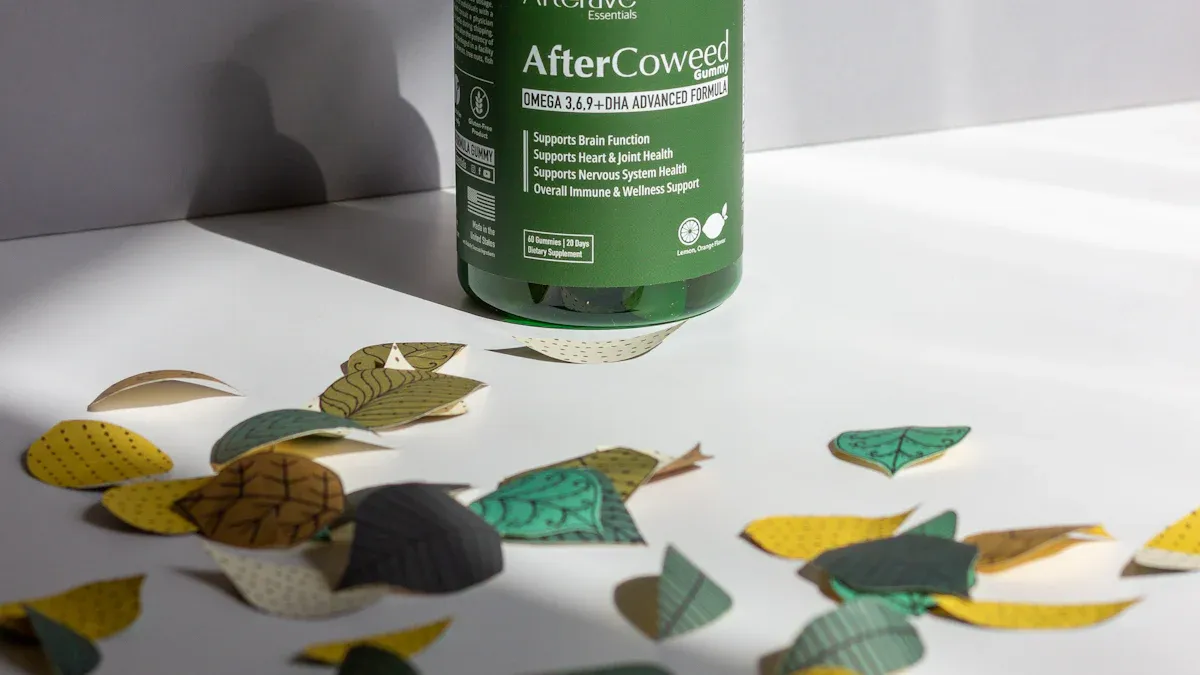
Role of a Balanced Diet
You might think supplements do all the work, but your diet plays a huge role in how well anti-aging routines work. When you eat a variety of healthy foods, you give your body the vitamins, minerals, and nutrients it needs to look and feel young. A balanced diet helps your skin stay strong and supports your body’s natural repair systems. Supplements like collagen, probiotics, carotenoids, and antioxidants can help with skin aging, but their effects depend on what you eat every day.
A balanced diet gives you nutrients that supplements alone cannot provide.
Whole foods offer extra benefits because they contain many nutrients that work together.
Supplements work best when you use them to fill gaps in your diet, not as a replacement for healthy meals.
Clinical studies show that supplements like probiotics and carotenoids can help protect your skin from sun damage, but you need a good diet for the best results.
If you have a vitamin deficiency, supplements can help, but eating well should always come first.
When you focus on beauty-from-within, you support your skin and body from the inside out. Eating colorful fruits, vegetables, lean proteins, and healthy fats helps you get the most out of your anti-aging supplements.
Importance of Hydration
Water is one of the simplest ways to help your body fight aging. When you stay hydrated, your body can move nutrients, control temperature, and keep your brain sharp. Research shows that people who drink enough water have lower risks of heart problems, dementia, lung disease, and stroke. Older adults need to pay extra attention to hydration because dehydration can make health problems worse.
Drinking about eight 8-ounce glasses of water a day is a good goal, but you may need more if you exercise or live in a hot place.
Studies show that people with normal serum sodium levels (between 137-142 mmol/L) live longer and have fewer health problems.
If your serum sodium goes above 144 mmol/L, your risk of early death and age-related diseases goes up.
Animal studies show that not drinking enough water can shorten lifespan and cause organs to wear out faster.
Hydration also helps your mood and memory, which are important for healthy aging.
When you drink enough water, you help your skin stay plump and smooth. You also help your body use supplements better, making your anti-aging routine more effective.
Prioritizing Quality Sleep
You might not realize it, but sleep is one of the most powerful tools for staying young. When you get enough sleep, your skin cells renew faster, and your body makes more collagen. This helps your skin stay firm and elastic. During sleep, your body releases growth hormone and melatonin, which help repair your skin and fight stress. If you miss out on sleep, your body makes more cortisol, which can break down collagen and speed up aging.
Sleep helps your skin heal and keeps it looking bright.
Poor sleep can slow down skin repair by over 30% and make your skin dry and red.
Getting enough sleep boosts blood flow, which brings nutrients to your skin and helps fade dark spots.
Detox processes during sleep clear out waste and tighten your pores.
Keeping a regular sleep schedule, managing light and temperature, and reducing stress can help you get better sleep.
Sleep supports your body’s natural repair systems, making it even more important than some skincare products.
Research shows that sleep helps your body balance hormones and slow down aging.
When you make sleep a priority, you help your anti-aging supplements work better and keep your skin looking young.
Tip: Try to go to bed and wake up at the same time every day. Your body loves routine, and your skin will thank you for it!
Daily Use of Sunscreen
You might think sunscreen is just for sunny days at the beach, but it actually works as your skin’s daily shield. Every time you step outside, your skin faces ultraviolet (UV) rays. These rays are the main reason skin ages faster. Wrinkles, dark spots, and rough patches often come from too much sun.
When you use sunscreen every day, you give your skin a strong layer of protection. Scientists agree that daily sunscreen use keeps your skin safe from UV damage. Dr. Bailey Skin Care points out that sunscreen is not just helpful—it’s essential. Sunscreen blocks the harmful rays that cause early wrinkles and sagging. If you skip sunscreen, even on cloudy days, your skin can still get hurt.
Tip: Make sunscreen part of your morning routine, just like brushing your teeth. Choose a broad-spectrum sunscreen with SPF 30 or higher. Don’t forget your neck, ears, and hands!
You might notice your skin stays smoother and brighter when you use sunscreen every day. Over time, you’ll see fewer fine lines and less uneven color. Sunscreen helps your anti-aging supplements work better because it stops new damage before it starts. If you want to keep your skin looking young, sunscreen is your best friend.
Regular Exercise and Stress Management
Exercise does more than keep you fit. It helps your body fight aging from the inside out. When you move your body, you boost blood flow, bring more oxygen to your skin, and help your cells repair themselves. Exercise also helps your body use anti-aging supplements better.
Here’s a quick look at how exercise and supplements work together:
Supplement | Exercise Type | What Happens in Your Body |
|---|---|---|
Quercetin | Brain games, running | Sharper thinking, less stress |
Resveratrol | Jogging, cycling | Stronger heart, more energy, less fatigue |
Curcumin | Walking, stretching | Healthier blood flow, better recovery |
When you exercise, your body makes more antioxidants. These antioxidants fight off free radicals, which can damage your cells and speed up aging. Supplements like quercetin, resveratrol, and curcumin give your body even more power to repair and protect itself. You get stronger muscles, better memory, and more energy.
Stress can make you look and feel older. It raises hormones that break down collagen and slow healing. Simple things like deep breathing, listening to music, or spending time with friends can help you manage stress. When you keep stress low, your skin glows and your body feels better.
Remember: You don’t need to run a marathon. Even a short walk or a few minutes of stretching each day can help you stay young and healthy. Pair regular movement with your favorite anti-aging supplements for the best results.
You get more from your routine when you look beyond collagen. Supplements like hyaluronic acid, CoQ10, and resveratrol each help with different parts of aging. Pairing these with healthy habits makes a real difference. Experts say genetics only play a small part in how long you live. Most of your results come from what you eat, how you move, and how you care for yourself.
Eat a variety of foods for better nutrition.
Move your body and manage stress.
Choose anti-aging supplements that fit your needs.
Always talk to a healthcare professional before starting something new. Your journey to healthy aging starts with small, smart steps.
FAQ
What is the best age to start taking anti-aging supplements?
You can start anti-aging supplements in your 20s or 30s. Early use helps you protect your skin and joint health. If you wait until you see signs of aging, you can still benefit from these supplements.
Can I take more than one anti-aging supplement at the same time?
Yes, you can combine different anti-aging supplements. Many people use a mix for better results. Always check with your doctor before you add new supplements to your routine.
How long does it take to see results from anti-aging supplements?
You may notice changes in your skin and joint health after four to twelve weeks. Some supplements work faster than others. Results depend on your body, diet, and lifestyle.
Are anti-aging supplements safe for everyone?
Most anti-aging supplements are safe for healthy adults. If you have health problems or take medicine, talk to your doctor first. Some supplements can interact with other treatments.
Do I still need sunscreen if I take anti-aging supplements?
Yes, you still need sunscreen every day. Supplements help your skin from the inside, but sunscreen protects you from sun damage. Both work together for the best results.
Can anti-aging supplements help with joint pain?
Some anti-aging supplements support both skin and joint health. Ingredients like collagen, omega-3s, and curcumin may help reduce joint pain and keep you moving easily.
